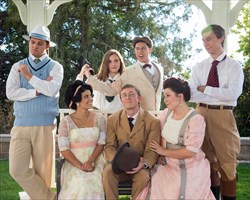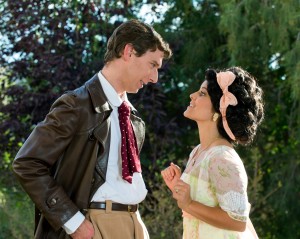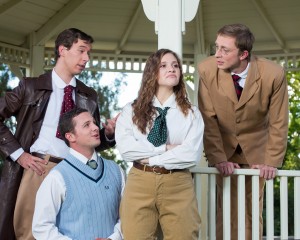
George Bernard Shaw wrote “Misalliance” in 1909, but BYU students today find meaning in its themes on marriage, gender roles and parent-child relationships. Cast members of the upcoming BYU staging of “Misalliance” drew parallels between the classic comedy and BYU culture.
The Department of Theatre and Media Arts’ production of this classic comedy will be performed in the HFAC’s Margetts Theater on Nov. 5-6, 11–13 and 17–21 at 7:30 p.m., and Nov. 7 and 14 at 2 p.m. An ASL performance will be on Nov. 12 at 7:30 p.m. Professor Barta Lee Heiner has directed Misalliance twice before, and this will be the last BYU show she directs before retiring the end of this year.
Heiner said she loves Shaw’s plays because his themes are relevant today.
“He deals with issues but he makes people laugh and then go ‘Oh wow! That’s interesting,'” Heiner said. “People learn more from laughter rather than getting beat over the head.”
The play centers around the engagement of Hypatia Tarleton, daughter of a newly rich shop owner, to aristocrat Bentley Summerhays. The Tarletons want to make certain Bentley is suitable for their daughter while Hypatia longs for adventure. Hypatia is not thrilled about the engagement but feels pressure to marry.
Savanah Smith, a senior who plays Hypatia in the play, said BYU students often feel similar pressure to marry.
“The double standard I have experienced is that we are all supposed to go on missions and graduate college,” Smith said. “At the same time if we do all of that it generally means we are single and over the age of 21. Now we are trying to move out of state to pursue further schooling or a career, and we are told that we shouldn’t leave Utah until we find a spouse.”
Hypatia’s wish for adventure to fall into her life comes true when an airplane crashes into a country house’s conservatory at the end of act one. This introduces two new characters: a handsome pilot named Joey Percival and female circus acrobat, Lina Szczepanowska, dressed in masculine attire. Hypatia pursues Percival, diverting from social propriety. Smith said she loves this about her character.

“Hypatia doesn’t care about social norms,” Smith said. “She pursues what she wants regardless of how it might look.”
Soren Barker, a senior student who plays Percival, said if BYU were to embrace a norm where both men and women can take the initiative in dating, it would, like a domino-effect, lead to gender equality in other areas of BYU life. He said he has had female professors who have felt gender discrimination.
“There’s a lot to be brought to the table by women,” Barker said. “‘Women think differently than men.’ That’s a blanket statement. We all think differently, and it’s good to have more voices in conversation.”
The rest of the men in the play try to woo Lina because she is foreign, exciting, different and mysterious, according to Ben Hess, a BYU alumnus who plays Mr. Tarleton, Hypatia’s father. Lina rejects their romantic advances to keep her independence in the play. Jonathan Low, a senior student who plays Julius Baker, said the character Lina does not invest any of her self-worth in her relationships with men.
“She celebrates her accomplishments,” Low said. “I think a lot of women today in our BYU culture could probably use a little bit of that. Just because a certain male isn’t interested in you doesn’t take away from any of your self-worth. It’s a good thing to be with someone you love and to be married but you can still be a wonderful person without a romantic partner.”
Shaw also uses the play to explore parent-child relationships. Hess said his character provides a lengthy speech on how parent-child relationships, while affectionate, can never be completely honest.
“If parents were honest with their children about everything they’ve done, they’d die of the shame of it and if parents knew everything their children were up to they’d die of the shame of it,” Hess said when explaining his character’s opinion.
Smith said growing older gives young adults perspective and helps them to see that their parents are human and make mistakes.
“This can change the relationship if we allow it to cloud our judgement, but I believe this knowledge can help us to love and understand our parents in a new way,” Smith said. “It also helps us not to be as afraid of parenthood knowing that our parents weren’t perfect either.”

Bradley MacKay, a freshman who plays Bentley Summerhays, said Shaw shows the shyness or formality that can result from children knowing their parents flaws or parents feeling they failed in teaching their children something. MacKay said he thinks moving away to college makes it easier for young adults to have open relationship with their parents.
“Not living in the same house and just going to visit once in a while, it got rid of the burden on my parents for me because they’re like, ‘OK, he’s good; he’s doing his own thing now.’ So it’s nice to go over and visit them now. I feel now like I talk to them more than I did before,” he said.
MacKay said he thinks Shaw’s discussions on marriage, gender roles and parental relationships within the context of the play are not Shaw’s own opinions; they are meant to emotionally trigger the audience and get people thinking about those topics and form their own views.
Low said students should come to the play prepared to hear intelligent, rich conversation because that is what the play is about.
“When people don’t see plays and see lots of movies, they go and want to be entertained; they want to sit back and relax but for this play you need to sit forward, engage and listen,” Low said.
Heiner and multiple cast members said they recognized how radical Shaw’s discussions in “Misalliance” were in the early 20th century, especially on women’s roles and female independence. They also said they see its relevance to today.
Smith said the women are in charge in this show. They do something while the men discuss. Smith said this tells a lot about how Shaw viewed women.
“What I would love to be implemented all over the world and specifically in our community at BYU is the worth of women,” Smith said. “The worth of a woman is not dependent on any man’s view, nor is it attached to her beauty, and social class.”




